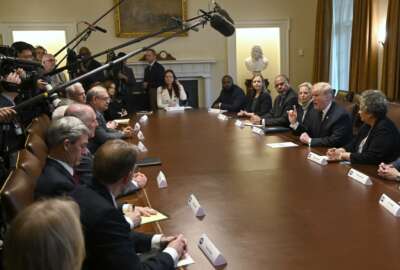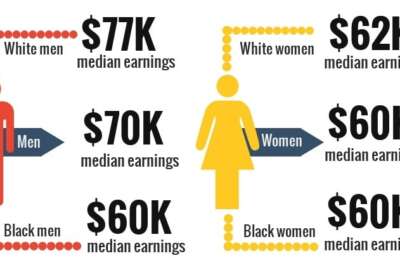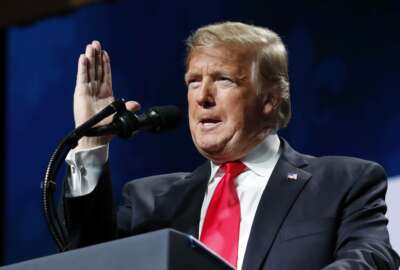
Trump administration urges agencies to prioritize employee back pay, begin plans to reopen
Both the House and Senate easily passed a three-week continuing resolution that would end the government shutdown and temporarily fund shuttered agencies through...
Both the House and Senate on Friday approved a temporary, three-week continuing resolution that would reopen shuttered agencies and end the longest government shutdown in U.S. history.
The bill now heads to President Donald Trump, who has indicated he will sign it, The Office of Management and Budget must next issue a memo to officially reopen all of government after a 35 day lapse in appropriations that began Dec. 22.
The Senate passed the continuing resolution with unanimous consent late Friday afternoon. The House followed up with a voice vote a few hours later. Both chambers also passed a resolution that sets up a conference committee to discuss 2019 appropriations for the Department of Homeland Security.
The continuing resolution would keep all of government open through Feb. 15, giving the President and congressional leaders time to negotiate a border security deal.
Votes came shortly after President Donald Trump on Friday announced he would support a temporary measure.
“I want to thank all of the incredible federal workers and their amazing families, who have shown such extraordinary devotion in the face of this recent hardship,” Trump said Friday afternoon from the White House. “You are fantastic people. You are incredible patriots. Many of you have suffered far greater than anyone but your families would know or understand. No only did you not complain but in many cases you encouraged me to keep going because you care so much about our country and about its border security. Again, I thank you.”
The Office of Management and Budget on Friday directed agencies to start preparing for “orderly reopening” even though the lapse in appropriations hasn’t officially ended.
“They should be prepared to prioritize restoring pay and benefits for employees, ensuring appropriate physical and information technology systems security access, recalling employees from furlough status, and performing any other critical support function needed to carry out these activities,” Margaret Weichert, OMB deputy director for management and acting OPM director, wrote in a memo.
Trump has already signed a bill into law that will retroactively pay furloughed and excepted employees once the the government shutdown ends.
Most civilian employees were scheduled to receive paychecks Friday but didn’t due to the government shutdown.
“I will make sure all federal employees receive their back pay very quickly, or as soon as possible,” Trump said.
The National Finance Center on Friday evening indicated its employees would be paid no later than Jan. 31.
In a Tweet, the White House also reiterated a promise that federal employees would be paid in the new few days.
Because of the President’s actions, Federal workers will be paid in the coming days.
To the public servants who have worked without pay and been furloughed, we thank you. To Congress, it is time to negotiate and address the humanitarian crisis on our border once and for all.
— The White House (@WhiteHouse) January 25, 2019
Though the Government Employee Fair Treatment Act advised federal payroll providers to begin processing pay as soon as the lapse in appropriations ends, employees won’t see a paycheck immediately.
Federal employee unions and organizations, as well as members of Congress, urged agencies to begin processing missed pay as soon as possible.
“Get the checks out, now,” Tony Reardon, president of the National Treasury Employees Union said in a statement Friday. “Federal employees haven’t been paid in more than a month and mortgage and rent are due next week. They shouldn’t have to wait a minute longer.”
Once both chambers of Congress pass the continuing resolution, it heads to the president’s desk for his signature. The Office of Management and Budget will need to issue a notice officially reopening shuttered agencies.
Agencies will ask their employees to report to their duty stations on their first normally scheduled day at work after government reopens. When government reopens, agencies can also begin to rescind stop-work orders sent to federal contractors during the shutdown.
In her memo, Weichert reiterated this process.
“Once the President has signed legislation to end the lapse, OMB will issue a memo that re-opens departments and agencies,” she wrote. “The Office of Personnel Management will then immediately notify employees through the OPM website and other media channels that they should expect direction from their employing agencies as to when to report for duty, so agencies should be prepared to provide appropriate direction. Similarly, agencies should reach out to their contractors and grantees as soon as practicable to provide instructions on restarting activities and addressing other impacts of the lapse.”
In a statement, Agriculture Secretary Sonny Perdue on Friday promised a “smooth reestablishment of USDA functions.”
“I extend my sincere thanks to the thousands of USDA workers who stayed on the job during the shutdown to offer as many of our normal activities as we could,” he said.
Meanwhile, federal unions, including the American Federation of Government Employees, praised the end of the government shutdown for now, but issued caution that federal agencies could find themselves in a similar situation again if lawmakers and the White House can’t agree in three weeks.
“Over the next three weeks, Congress must pass full-year appropriations for all government agencies as well as legislation to make all affected federal employees whole,” AFGE National President J. David Cox said. “We are urging Congress to act to prevent the use of shutdowns from ever occurring again.”
Hope for a pay raise in 2019?
While Congress waited for Trump’s speech in the Rose Garden to begin, House Democrats introduced new legislation that would bring pay for civilian employees in line with that of military members for the rest of this year.
The Federal Civilian Workforce Pay Raise Fairness Act would authorize a 2.6 percent pay raise for civilian employees in 2019. Trump had previously finalized a pay freeze for civilian employees on the final days of 2018.
Rep. Gerry Connolly (D-Va.) and House Majority Leader Steny Hoyer (D-Md.) introduced the bill. The 2.6 percent raise for civilian employees would be deemed to apply on the first pay period beginning on or after Jan. 1., meaning the pay boost would be a retroactive one.
The bill would also freeze pay for political appointees in 2019, reversing an ill-timed consequence of government’s collective failure to pass appropriations bills or stop-gap funding for federal agencies by the end of 2018.
Pay for political appointees has been frozen since 2014.
The House Rules Committee is expected to consider the bill Tuesday, Jan. 29.
Copyright © 2024 Federal News Network. All rights reserved. This website is not intended for users located within the European Economic Area.
Nicole Ogrysko is a reporter for Federal News Network focusing on the federal workforce and federal pay and benefits.
Follow @nogryskoWFED
Related Stories

By the numbers: How much money is the shutdown costing fed families?




